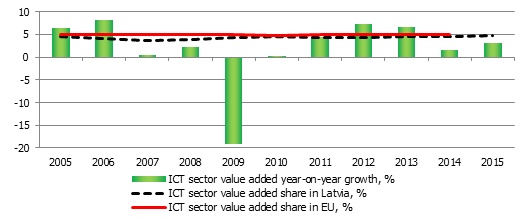Analytics, Banks, Direct Speech, Industry, Innovations, Internet, Latvia, Technology, Telecomunications
International Internet Magazine. Baltic States news & analytics
Tuesday, 16.12.2025, 05:58
ICT is almost a perfectly performing sector
 Print version
Print version |
|---|
The ICT sector consists of six subsectors: publishing activities, video and television programme production, programming and broadcasting activities, telecommunications, computer programming and the related activities as well as information service activities. Historically, the largest part of the ICT sector turnover in Latvia has been generated in the telecommunications sector (about 60%), where important players of the telecommunications market are operating. But over the last few years, computer programming and information service activities have been rapidly gaining their relative share.

The ICT sector employs 2.9% (2015) of the total number of
working population. Taking into account that the sector accounts for about 5%
of total value added, it is easily seen that the sector's productivity hovers
above the average level. In fact, it has the most elevated productivity level
among all sectors. But, certainly, labour productivity of such a level can also
be explained by a comprehensive degree of automation and capital intensity. For
instance, the telecommunications sector is very capital intensive (technologies
are cost intensive), thus providing ample value added per person employed.
However, the huge capital and technology intensity is the factor why the salaries
paid by the sector are among the largest across all sectors. Higher average
salaries are paid only in the financial sector. The large salaries of the ICT
sector are determined by several factors. Comprehensive technological intensity
has already been mentioned. It means that there are fewer workers employed but
their skills have to be very advanced. For instance, computer programming
requires very specific training. The main reason, however, is the fact that
Latvia's ICT sector is operating in an environment of open market competition.
The ICT sector has almost no transnational barriers in comparison to other
sectors. Latvian ICT companies are competing and collaborating with companies
from all over the world. That is why the ICT sector plays an important role in
external trade. For instance, in 2015 the ICT sector accounted for almost 10%
of the current account surplus.
What future challenges does the ICT sector face in Latvia?
During the last decade, the availability of PCs and the internet in households
and companies has increased substantially. That has been a significant factor
driving the growth of the ICT sector. Further challenges will be related to an
increase in computer/internet literacy of the population. The range of
activities using ICT is still very narrow in Latvia. Many do use the internet
for entertainment purposes, but only a few take the advantage of the full
spectrum of offered opportunities, like communication with the public sector,
e-learning, e-purchases, etc. Moreover, the ICT sector is transforming: the
importance of mobility is increasing, therefore, the development of mobile
applications and solutions is currently the main driver of changes in the ICT
sector,
https://www.macroeconomics.lv/ict-almost-perfectly-performing-sector








 «The Baltic Course» Is Sold and Stays in Business!
«The Baltic Course» Is Sold and Stays in Business!

